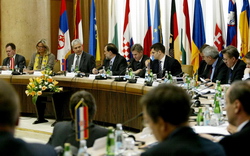- Serbia
Get to know Serbia
- Citizens
Culture and science
Health services
Pension and disability insurance
- Business
Employment
Economy
- Media
- Government
- Contact
Keep in touch
Contact form
Back
Keepin touch
Whether you have a question, comment, suggestion or any problem in the purview of the government, send us your message and we will try to respond as soon as possible. If your problem is not in our purview, we will forward your message to the relevant institution.
Q:
A:
Third ministerial conference on Danube Cooperation Process opens
Belgrade,
18 April 2007
Serbian President Boris Tadic opened today the 3rd ministerial conference of the Danube Co-operation Process (DCP) at which apart from Serbian officials, other foreign ministers, EU member countries’ representatives and representatives of international organisations will also be present.
The conference will discuss and adopt the final document in which ministers will state their positions on current processes on the Danube, support some of the regional initiatives and reach agreement on the next ministerial conference to be held in Ukraine.
Some issues regarding Corridor 7, protection from floods, environmental protection and culture projects will also be looked at.
Serbian Minister of Foreign Affairs Vuk Draskovic addressed the gathering and said that the Danube links the most developed regions of Europe with other parts of it which are still in transition, adding that it is time the Danube became the main trade route in the continent.
Austrian Foreign Minister Ursula Plassnik said that the Danube’s greatest potential is the diversity of people living on its banks which must be exploited for the betterment of Europe since the Danubian region must become the core of economic development.
The Danube is the main artery of a new and united Europe and a symbol of the essence of European unity, emphasised Plassnik and proposed that before summer a meeting of DCP officials be held since the next ministerial meeting will take place two years from now in Ukraine.
Special Co-ordinator of the Stability Pact for South Eastern Europe Erhard Busek endorsed her initiative and invited all South Eastern European countries to invest more effort in the development of the Danube since mere 7-15% of the river’s transit capacity is being employed.
The Danube Co-operation Process began in 2001 as an Austrian-Romanian initiative and was joined in 2002 by the European Commission and the Stability Pact for South Eastern Europe.
DCP gathers 13 Danubian countries whose territory gravitates toward the Danube and these are Austria, Bosnia and Herzegovina, Bulgaria, Croatia, the Czech Republic, Germany, Hungary, Romania, Ukraine, Slovakia, Slovenia and Serbia.
Some issues regarding Corridor 7, protection from floods, environmental protection and culture projects will also be looked at.
Serbian Minister of Foreign Affairs Vuk Draskovic addressed the gathering and said that the Danube links the most developed regions of Europe with other parts of it which are still in transition, adding that it is time the Danube became the main trade route in the continent.
Austrian Foreign Minister Ursula Plassnik said that the Danube’s greatest potential is the diversity of people living on its banks which must be exploited for the betterment of Europe since the Danubian region must become the core of economic development.
The Danube is the main artery of a new and united Europe and a symbol of the essence of European unity, emphasised Plassnik and proposed that before summer a meeting of DCP officials be held since the next ministerial meeting will take place two years from now in Ukraine.
Special Co-ordinator of the Stability Pact for South Eastern Europe Erhard Busek endorsed her initiative and invited all South Eastern European countries to invest more effort in the development of the Danube since mere 7-15% of the river’s transit capacity is being employed.
The Danube Co-operation Process began in 2001 as an Austrian-Romanian initiative and was joined in 2002 by the European Commission and the Stability Pact for South Eastern Europe.
DCP gathers 13 Danubian countries whose territory gravitates toward the Danube and these are Austria, Bosnia and Herzegovina, Bulgaria, Croatia, the Czech Republic, Germany, Hungary, Romania, Ukraine, Slovakia, Slovenia and Serbia.
-
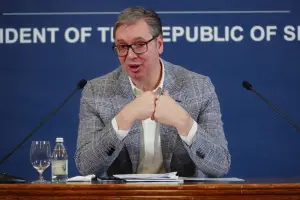 Belgrade, 4 January 2026
Belgrade, 4 January 2026Violation of UN Charter has become dominant principle of contemporary politics
-
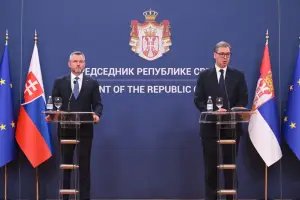 Belgrade, 21 December 2025
Belgrade, 21 December 2025Strengthening cooperation with Slovakia in many areas
-
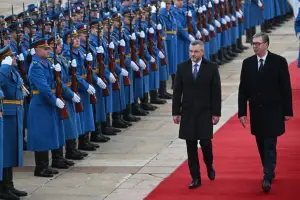 Belgrade, 21 December 2025
Belgrade, 21 December 2025President of Slovakia ceremonially welcomed in front of Palace of Serbia
-
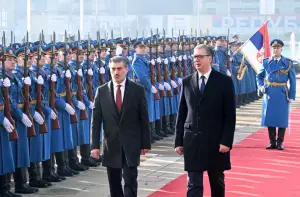 Belgrade, 18 December 2025
Belgrade, 18 December 2025Vučić welcomes President of Georgia in front of Palace of Serbia
-
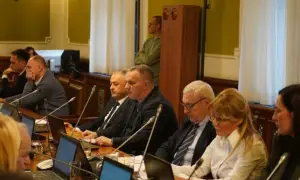 Belgrade, 15 December 2025
Belgrade, 15 December 2025Serbia needs strong, stable education system
-
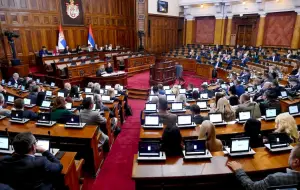 Belgrade, 3 December 2025
Belgrade, 3 December 2025Parliament adopts 2026 budget
-
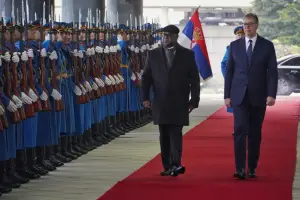 Belgrade, 28 November 2025
Belgrade, 28 November 2025Serbian President welcomes President of DR Congo
-
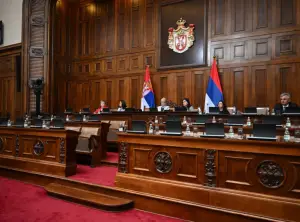 Belgrade, 7 November 2025
Belgrade, 7 November 2025Parliament adopts multiple laws
-
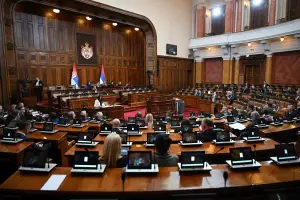 Belgrade, 22 October 2025
Belgrade, 22 October 2025Parliament adopts several laws, ratifies multiple international agreements
-
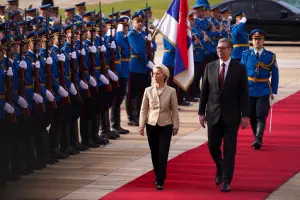 Belgrade, 15 October 2025
Belgrade, 15 October 2025Vučić welcomes Ursula von der Leyen in front of Palace of Serbia

